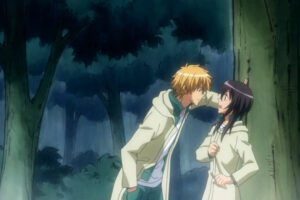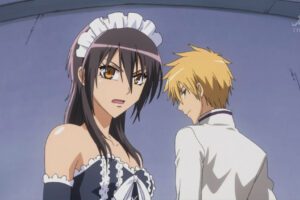Fruits Basket is a well-known shojo romance anime that has gained a reputation as a classic. However, there is a growing concern that the hype surrounding this anime is overblown. In this article, we will explore the reasons behind this hype and debunk some of the common misconceptions about Fruits Basket’s romantic genre. Whether you are a die-hard fan of the anime or a newcomer curious about the hype, this article will provide you with a fresh perspective on Fruits Basket. So, sit back, relax, and let’s dive into the world of Fruits Basket.
Understanding the Shojo Romance Genre in Fruits Basket
Fruits Basket is a popular shojo romance anime that has gained a reputation as a classic in the genre. Shojo anime refers to anime that is targeted towards young girls and often features romantic relationships as a central theme. In Fruits Basket, the story follows Tohru Honda, a high school girl who finds herself living with the Sohma family, who are cursed to turn into animals of the Chinese zodiac when hugged by someone of the opposite sex.
The shojo romance genre in Fruits Basket focuses on the development of relationships between characters, particularly between Tohru and the Sohma family members. The anime explores themes of love, loss, and personal growth, with each character struggling to overcome their individual traumas and find happiness. The romantic relationships in Fruits Basket are often portrayed in a subtle and nuanced way, with the focus being on the emotional connection between the characters rather than physical intimacy. This approach to romance is a hallmark of the shojo genre, which often prioritizes emotional depth and character development over action and adventure.
Overall, understanding the shojo romance genre in Fruits Basket requires an appreciation for the complexities of human relationships and the emotional journeys that characters undertake. While Fruits Basket may not be for everyone, its popularity and reputation as a classic in the genre are a testament to the enduring appeal of shojo romance anime.
Debunking the Romanticized Narrative of Fruits Basket

Fruits Basket is a popular shojo romance anime that has been praised for its heartwarming story and relatable characters. However, the romanticized narrative of the show may not be as appealing as it seems. In fact, the show’s portrayal of romance may be problematic and unrealistic.
One of the main issues with Fruits Basket’s romanticized narrative is its portrayal of toxic relationships. The show often romanticizes unhealthy behaviors such as possessiveness, jealousy, and manipulation. These behaviors are not only harmful but can also be triggering for viewers who have experienced similar situations in their own relationships. Moreover, the show’s depiction of love as something that requires self-sacrifice and suffering can be damaging to young viewers who may internalize these messages as normal and acceptable.
Furthermore, Fruits Basket’s romanticized narrative can also be seen as perpetuating gender stereotypes. The show often depicts women as passive and submissive, while men are portrayed as dominant and protective. This reinforces the idea that women are objects to be protected and saved by men, rather than individuals with agency and autonomy. This can be harmful to both men and women, as it limits their understanding of gender roles and perpetuates harmful societal norms.
In conclusion, while Fruits Basket may be a beloved shojo romance anime, its romanticized narrative may not be as appealing as it seems. The show’s portrayal of toxic relationships and gender stereotypes can be harmful to viewers and perpetuate harmful societal norms. It is important to critically analyze media and understand the messages it conveys, in order to promote healthy relationships and challenge harmful societal norms.
The Real Appeal of Fruits Basket: Themes Beyond Romance
While Fruits Basket may be known for its romantic themes, the real appeal of the anime lies in its exploration of complex human emotions and relationships. The show delves into themes of trauma, grief, and healing, making it a compelling watch for audiences of all ages.
One of the most prominent themes in Fruits Basket is the impact of trauma on individuals and their relationships. The characters in the show have all experienced some form of trauma, whether it be the loss of a loved one or emotional abuse. Through their interactions with each other, they learn to navigate their pain and find healing. This exploration of trauma and healing is not often seen in shojo romance anime, making Fruits Basket a unique and refreshing watch.
Another theme that Fruits Basket explores is the importance of found family. The main character, Tohru, is an orphan who finds herself living with the mysterious and dysfunctional Sohma family. As she gets to know the members of the family, she begins to form deep connections with them, ultimately creating a sense of belonging and love that she had never experienced before. This theme of found family is relatable to many viewers and adds an emotional depth to the show beyond its romantic plotlines.
Overall, Fruits Basket’s real appeal lies in its exploration of complex human emotions and relationships. Its themes of trauma, healing, and found family make it a standout in the shojo romance genre and a must-watch for anime fans.
Fruits Basket’s Legacy: How It Changed the Anime Industry
Fruits Basket is a classic shojo romance anime that has captured the hearts of many anime fans worldwide. However, beyond its romantic narrative, Fruits Basket’s legacy goes beyond its genre. It has significantly impacted the anime industry, paving the way for more diverse and inclusive stories.
One of the most significant contributions of Fruits Basket is its portrayal of mental health issues. The anime tackled depression, anxiety, and trauma in a way that was relatable and sensitive. It showed how mental health struggles can affect a person’s life and relationships, and how seeking help is essential in overcoming them. This approach was groundbreaking, as mental health was rarely discussed in anime before Fruits Basket’s release.
Fruits Basket also challenged gender norms and stereotypes in its portrayal of male characters. The anime presented male characters who were emotional, vulnerable, and nurturing, breaking the traditional masculine image in media. This representation was significant in promoting gender equality and acceptance of diverse expressions of masculinity. Furthermore, Fruits Basket’s success proved that anime with female protagonists and a female target audience can be commercially successful, challenging the notion that anime is only for male audiences.
In conclusion, while Fruits Basket is undoubtedly a popular shojo romance anime, it’s important to consider that its hype may be overblown. While it does have its merits, such as its relatable characters and themes of self-love and acceptance, it’s not necessarily the be-all and end-all of romantic anime. It’s important to keep an open mind and explore other anime in the genre to truly appreciate the diversity and depth of storytelling that anime has to offer.











